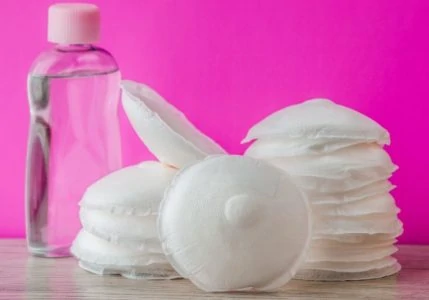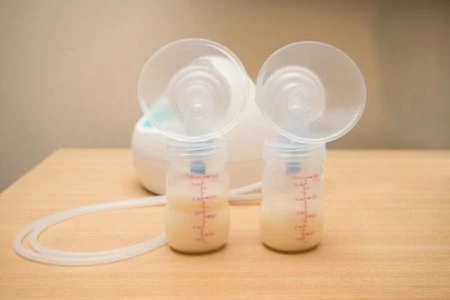Have you been dreaming of the foods that were off-limits during your pregnancy? Are they safe to eat now that your baby has arrived, or are there still strict rules for breastfeeding?
You will find conflicting opinions online, but experts generally agree on the basics.
We don’t want you to stress about harming your baby with your diet. We will look at the most recent data, stick to the facts, and bust some common myths about what you can and can’t eat while nursing.
Key Takeaways
- Watch the mercury: Avoid high-mercury fish like shark, swordfish, and king mackerel to protect your baby’s developing nervous system.
- Caffeine is okay in moderation: Stick to about 200 to 300 milligrams per day (roughly 2 cups of coffee).
- Alcohol requires timing: It is safe to have an occasional drink, but wait at least 2 hours per drink before nursing.
- Allergies are rare: Peanuts, dairy, and spices are generally safe unless your family has a specific history of allergies.
Foods To Avoid While Breastfeeding
For nine months, you were a paragon of virtue. You skipped the sushi bar, avoided soft cheeses, and said no to wine. You had to steer clear of many things to keep your growing baby safe.
Now that your little one is here, are the rules the same?
Thankfully, they aren’t. Despite what your mother-in-law or neighbors might say, there are far fewer restrictions on your diet now. Very few foods pass directly through breast milk in a way that harms the baby. However, some substances can affect your milk supply or your baby’s comfort.
Here is the shortlist of foods and substances you should actually limit or avoid.
1. High-Mercury Fish
Fish is a fantastic source of protein and healthy fats. You should definitely include it in your meal plans. However, you still need to be picky about the type of fish you choose.
Pollution has caused chemicals to accumulate in our oceans. One specific chemical, methylmercury, is a major concern.
Plankton feed small fish, small fish feed big fish, and the mercury levels rise with every step up the food chain. The larger and older the fish, the more mercury it likely contains (1).
Mercury passes through breast milk and can affect your baby’s developing brain and nervous system. You should avoid swordfish, shark, king mackerel, and tilefish (2).
Safe Seafood Options
The FDA provides a helpful chart to guide your seafood choices, bringing many pregnancy-banned fish back onto your menu (3).
What about sushi? The risks of bacterial contamination — which is why sushi was to be avoided in pregnancy — are lower when breastfeeding. Choose reputable sources for premade sushi, and ensure high-quality fish is used.
Editor's Note:
Michelle Roth, BA, IBCLC2. Excessive Caffeine
If you are a coffee lover, breathe a sigh of relief. You can have your daily fix. You just need to keep it in moderation.
Most experts recommend capping caffeine intake at 200 to 300 milligrams per day. This is roughly two to three cups of coffee.
Small amounts of caffeine pass into your milk. While most babies handle this fine, some are more sensitive than others. Caffeine is a stimulant; too much might make your baby alert, jittery, or fussy.
Remember to check other sources of caffeine beyond your morning brew:
- Sodas and energy drinks: These often pack a high caffeine punch.
- Chocolate: Dark chocolate contains more caffeine than milk chocolate.
- Medications: Some pain relievers and cold medicines include caffeine.
If you notice your baby seems wakeful after you drink coffee, try timing your cup for right after a breastfeeding session. This gives your body a few hours to metabolize the caffeine before the next feed.
3. Alcohol
You might think that glass of wine is still strictly forbidden. Don’t worry; it’s not. While we aren’t encouraging heavy drinking, an occasional alcoholic beverage is generally considered safe.
The key is timing. Alcohol clears from your breast milk at the same rate it clears from your blood. It typically takes one to two hours for a single unit of alcohol (like one glass of wine or one beer) to leave your system (4).
To play it safe, wait at least two hours after finishing a drink before you nurse.
Alcohol can also inhibit your let-down reflex. This means your baby might struggle to get enough milk if you nurse while alcohol is still in your system (5).
4. Herbs That Reduce Supply
While many herbs are great for cooking, some can actually lower your milk production if consumed in large quantities. These are known as anti-galactagogues.
You would likely need to eat massive amounts to see a drastic drop, but if you are struggling with supply, be mindful of:
- Peppermint: Watch out for strong peppermint teas or excessive candies.
- Sage: Often found in holiday stuffing or savory dishes.
- Parsley: Usually fine as a garnish, but avoid large salads where it is the main green.
Moms often use these specific herbs intentionally when they are ready to wean their toddler (6).
Dispelling Common Myths
Friends and relatives love to give advice. Unfortunately, much of it is based on old wives’ tales. Let’s clear up the confusion around foods you can actually eat.
1. Peanuts
The myth suggests that eating peanuts causes peanut allergies in babies. Recent science says the opposite is true. Early exposure through breast milk may actually help prevent allergies.
Unless you possess a peanut allergy yourself, go ahead and enjoy that PB&J sandwich.
Research shows that babies whose moms eat peanuts while breastfeeding may have a lower chance of developing an allergy later in childhood (7).
However, keep an eye on your baby. If you notice rashes, congestion, or diarrhea after nursing, seek medical advice. If there is a strong family history of peanut allergies (like a sibling), ask your pediatrician before introducing them to your diet.
2. “Gassy” Vegetables
We all know broccoli, cabbage, and beans can make us gassy. But does that gas pass to the baby?
In a nutshell: No.
Gas is produced in your intestines as bacteria break down fiber. Neither the gas nor the fiber passes into your breast milk. The acidity or gas you feel stays in your digestive tract.
If your baby is gassy, it is likely due to their own immature digestive system or swallowing air while feeding. It is rarely the broccoli you ate for lunch.
Leafy greens and fibrous veggies are excellent for your health. They keep your digestion moving and provide essential nutrients (8). Don’t skip them based on a myth.
3. Spices and Garlic
You don’t need to eat bland food. Garlic, chili, and curry are generally fine.
Strong flavors can change the taste of your breast milk, but this is actually a good thing. It introduces your baby to different flavors early on, which might make them a more adventurous eater when they start solids.
If your baby seems fussy after you eat a particularly spicy meal, you can try dialling it back next time. But for most babies, variety is the spice of life.
4. Cow’s Milk
You can usually bring cheese and yogurt back into your diet.
Some people worry that dairy causes colic. While cow’s milk protein allergy (CMPA) is real, it is relatively rare (9).
Unless your baby shows specific symptoms, like blood in the stool, severe eczema, or vomiting, you generally do not need to cut out dairy. Your breast milk provides calcium and fat that is great for the baby.
FAQs
Enjoy Your Food
While there are a few things to limit, your diet can largely return to normal. You have done the hard work of pregnancy; now you can enjoy a wider variety of meals.
Let’s be real: in those first few months, your diet might be survival-based. You will grab whatever is easiest. It is totally fine to have a bag of chips or leftover pizza.
Your body is an amazing machine. Even if your diet isn’t perfect, your breast milk will still provide high-quality nutrition for your baby (10). Listen to your body, stay hydrated, and try to get some rest.










